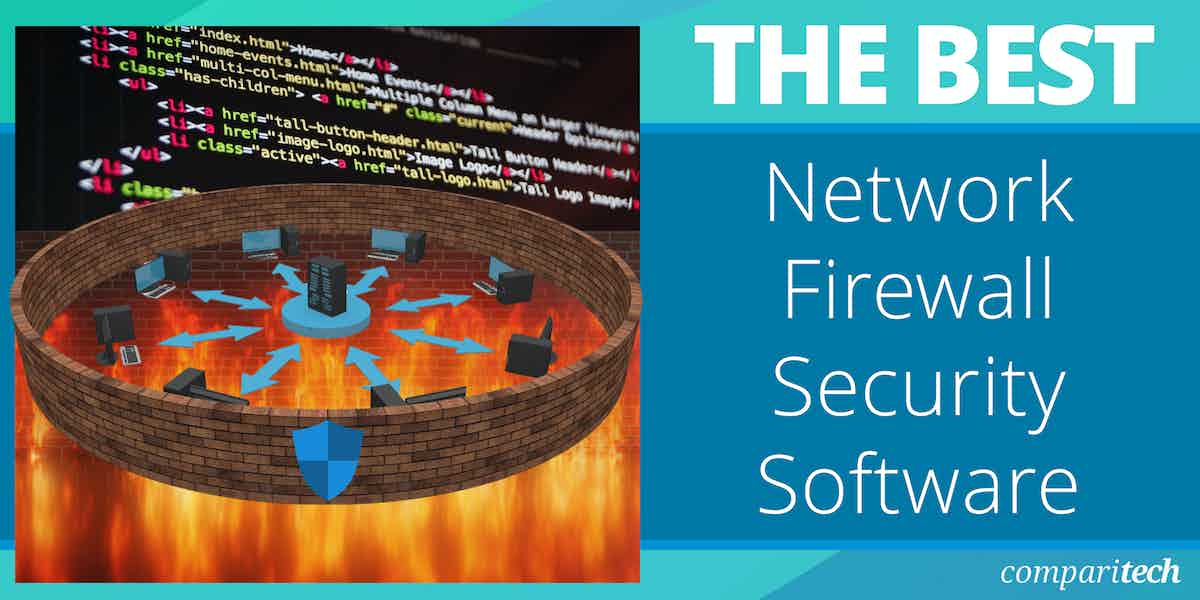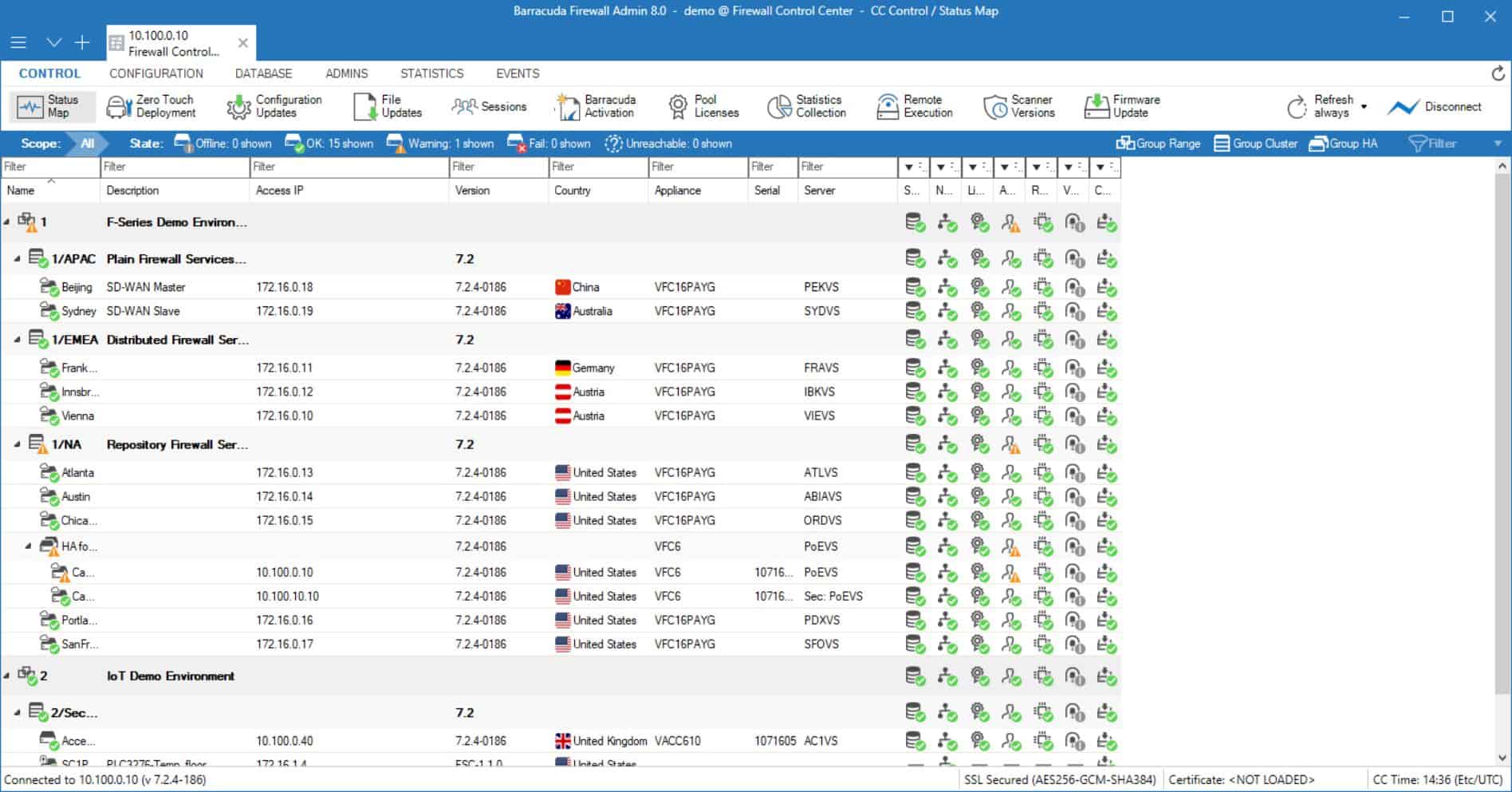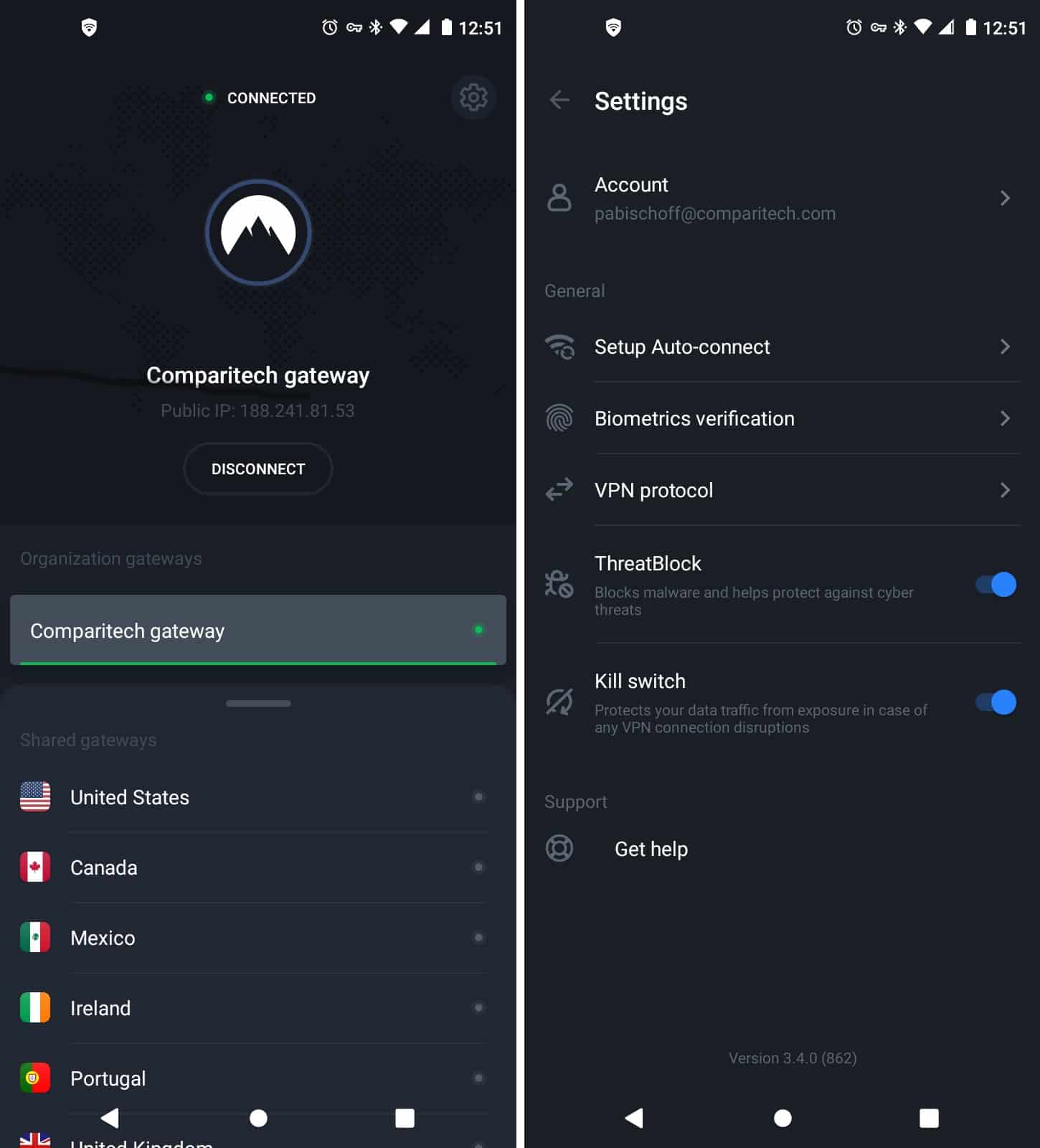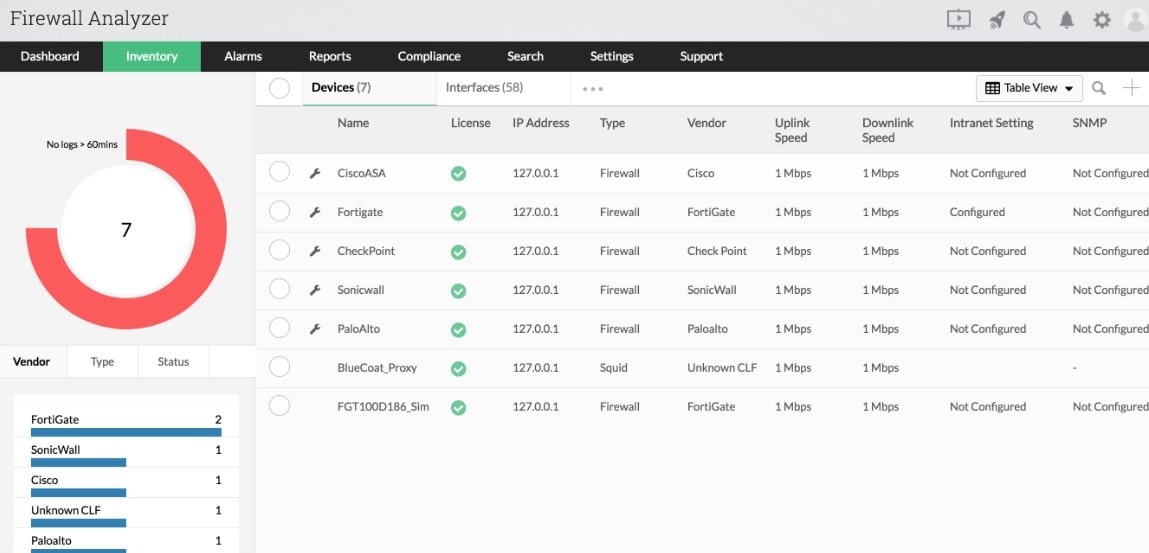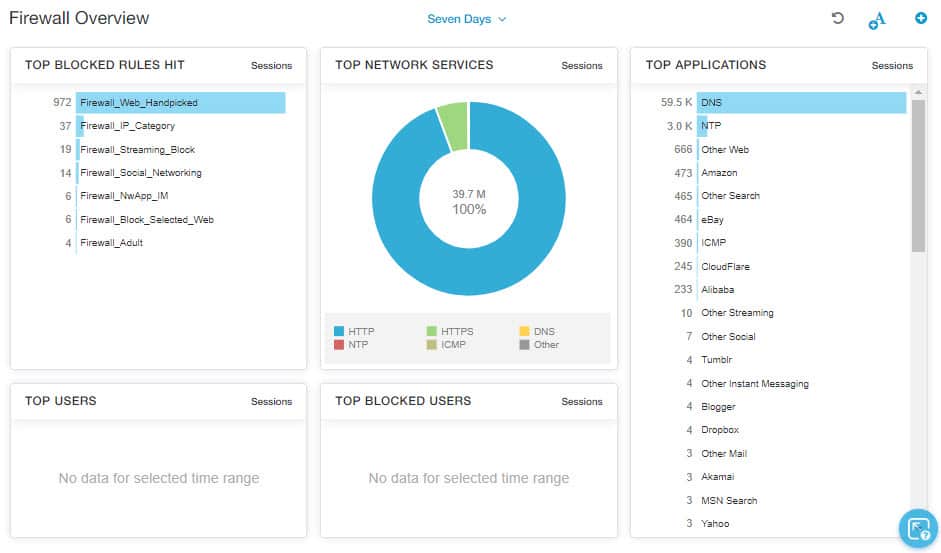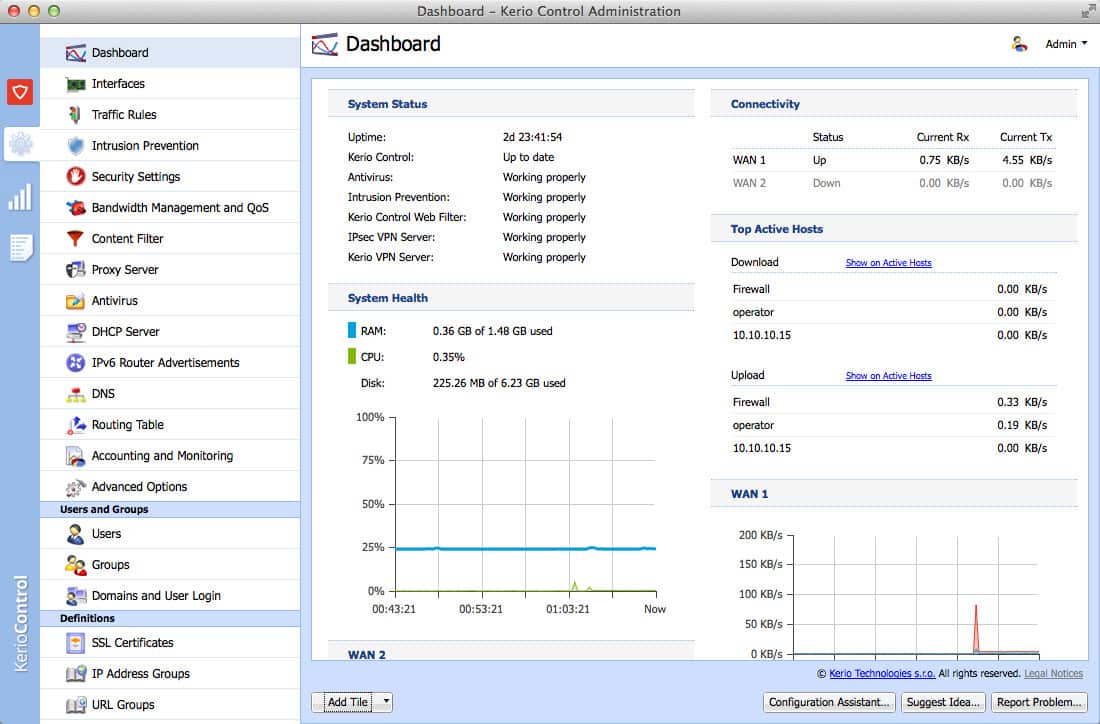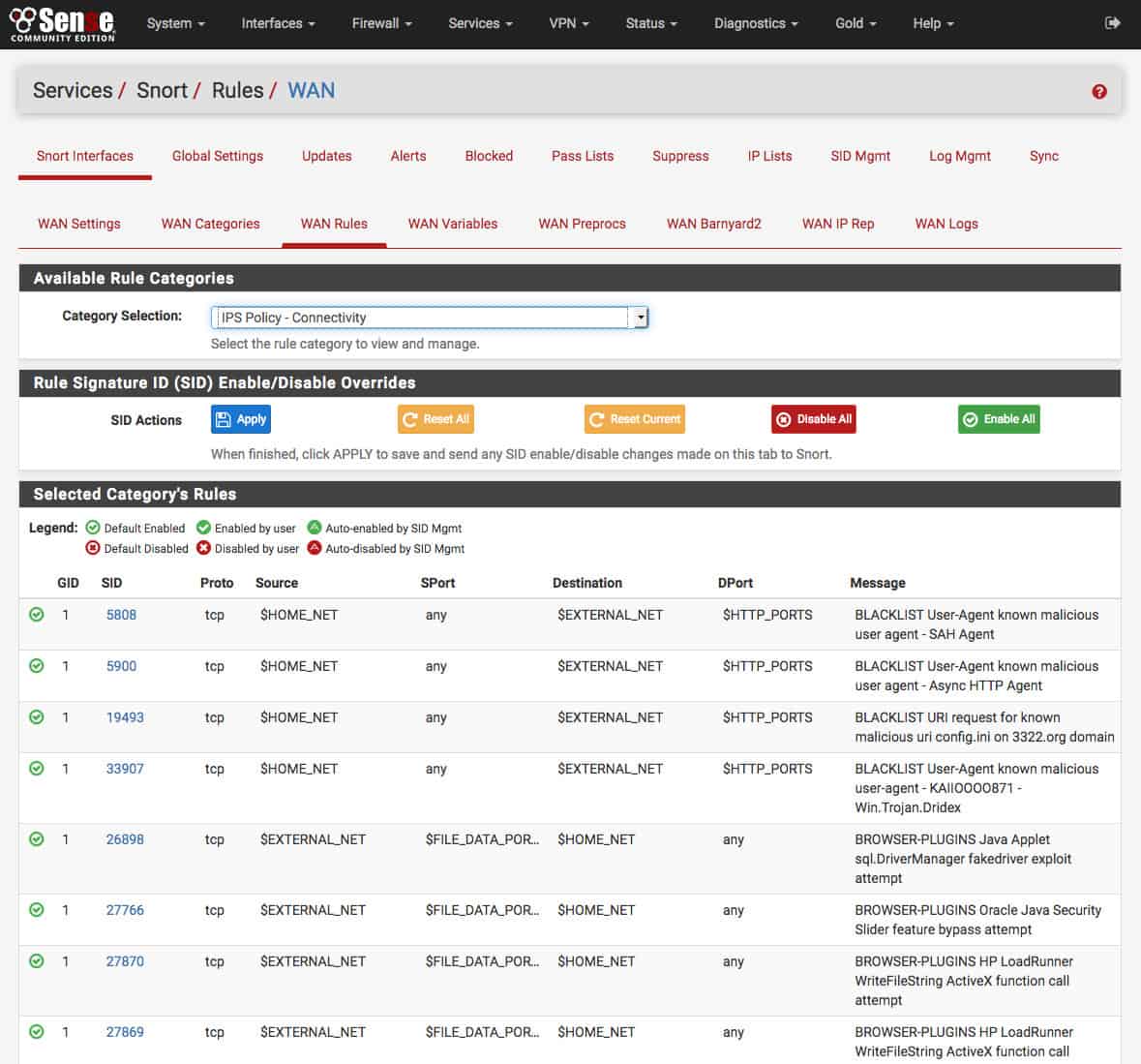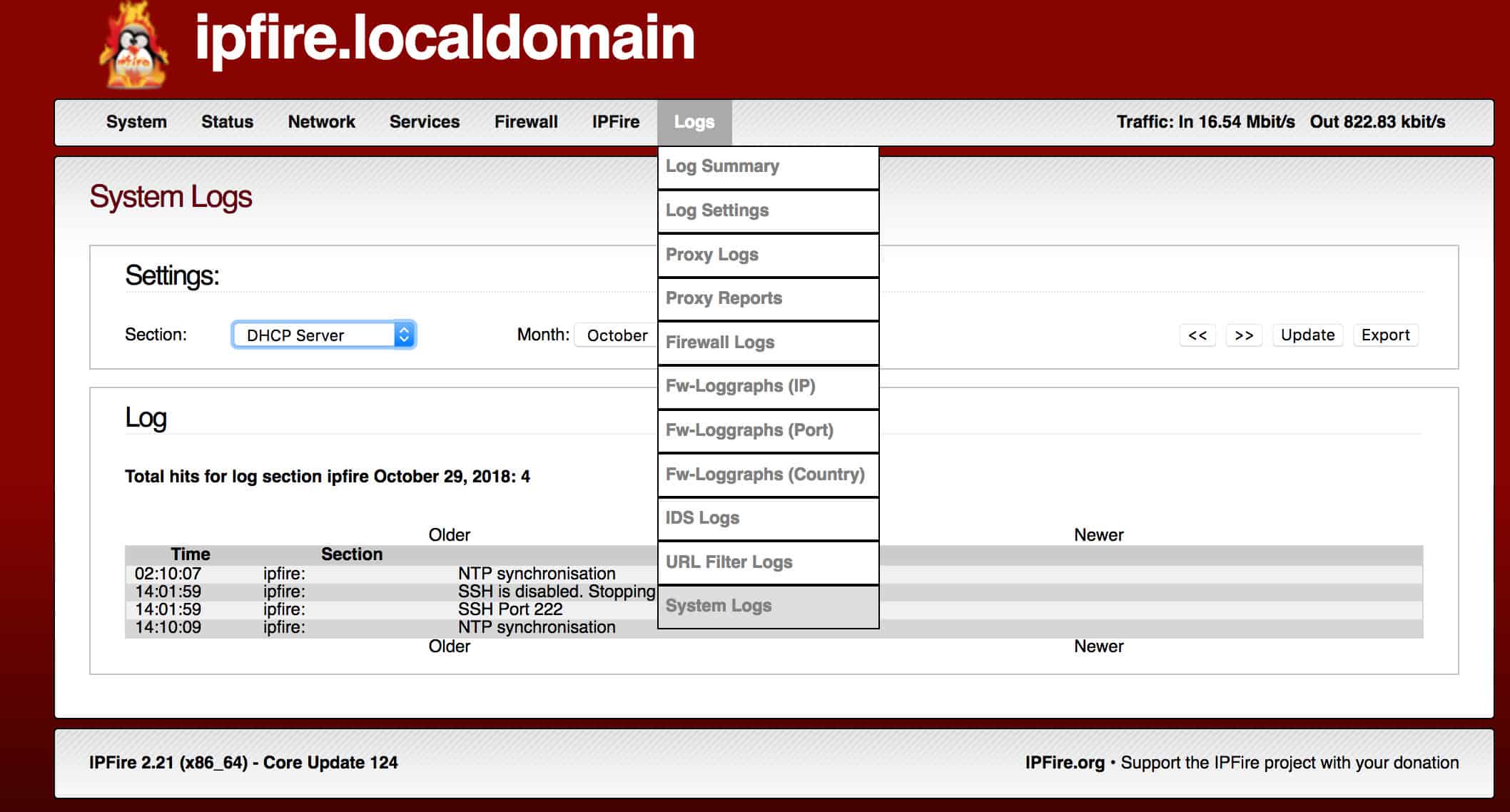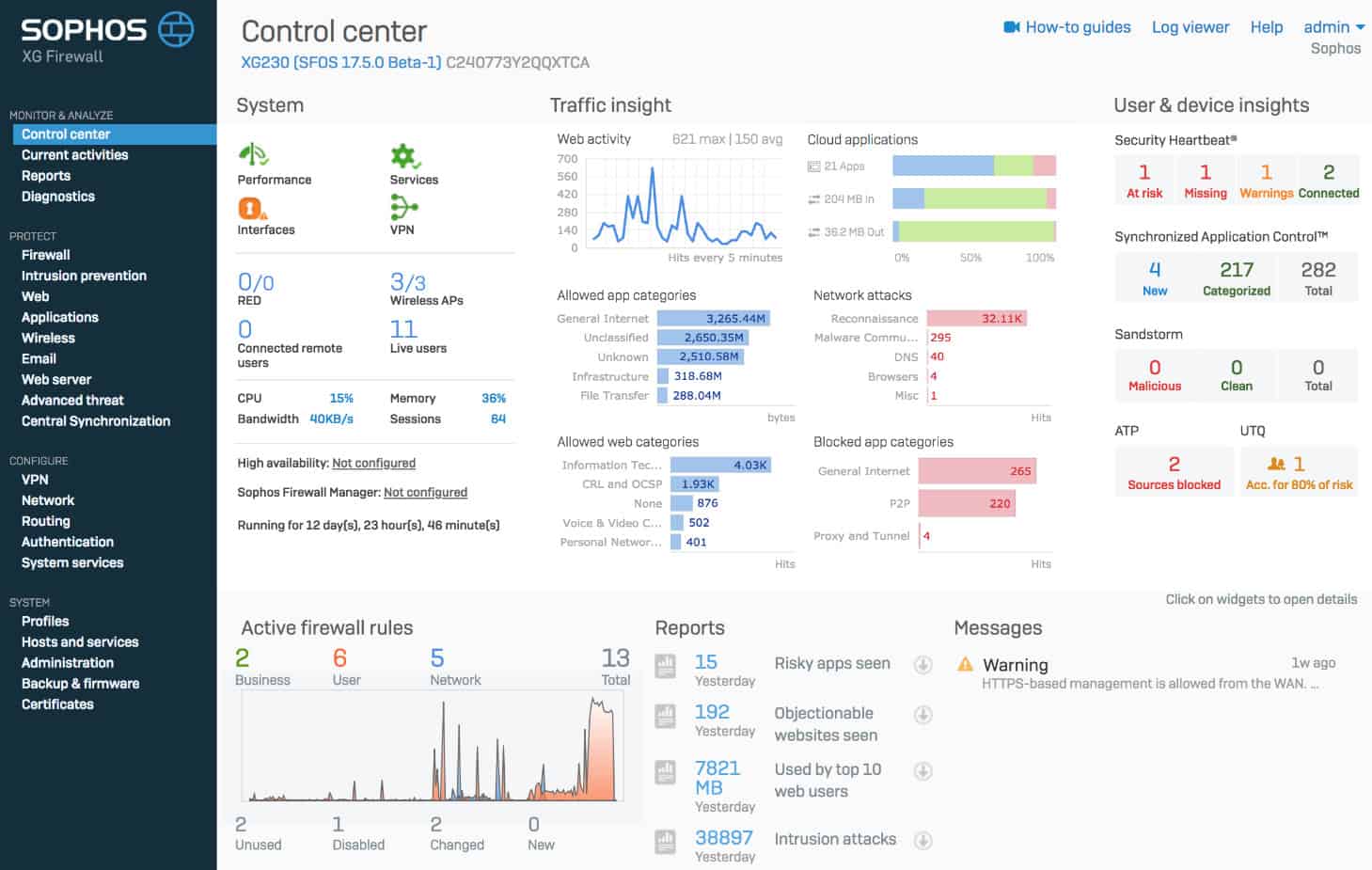A network firewall is one of the most essential security tools for protecting your organization’s digital infrastructure. As cyber threats continue to evolve in complexity and frequency, having a robust firewall in place is critical for defending against unauthorized access, data breaches, and various types of malware.
Here is our list of the best network firewall security software:
- Barracuda SASE MSP Firewall EDITOR’S CHOICE This is a virtual network security system. It forms a secure gateway to an SD-WAN, combining to form a SASE and scan packets both into and out of the network. The service is hosted on the cloud and can perform data loss prevention as well as threat protection. Get a free demo.
- NordLayer (FREE DEMO) This access control and connection security package includes an edge firewall that covers both virtual and physical networks plus remote workers. Access a free demo.
- ManageEngine Firewall Analyzer (FREE TRIAL) This security tool interfaces with firewalls operating on a network to coordinate security policies and gathers attack information. Available for Windows Server, Linux, or AWS. Access a 30-day free trial.
- Site24x7 (FREE TRIAL) This cloud-based package provides real-time visibility into network devices, including hardware firewalls. Get a 30-day free trial.
- Zscaler Cloud Firewall Cloud-based next-generation firewall that has SSL inspection, granular firewall policies, and real-time monitoring.
- GFI Languard KerioControl Network firewall with an Intrusion Prevention System, deep packet inspection, configurable traffic policies, and usage reports.
- CrowdStrike Falcon Firewall Management The CrowdStrike Falcon suite of cybersecurity services includes endpoint protection as well as a firewall protection system.
- pFSense Open-source firewall that can be installed on any hardware and comes with a web-based GUI with add-ons.
- IPFire Open-source firewall with an Intrusion Prevention System, alerts, Stateful Packet Inspection, and add-ons.
- SophosXG Firewall Next-generation firewall with a dashboard, automatic threat response, sandboxing, and SSL inspection.
Firewalls act as a barrier between your internal network and external sources, monitoring and controlling incoming and outgoing traffic based on predetermined security rules. They provide a first line of defense, helping organizations maintain the integrity, confidentiality, and availability of their networks.
With a wide variety of firewalls available in the market, choosing the right one for your business needs can be a challenging task. Modern network firewalls come in many forms: hardware firewalls, software firewalls, and cloud-based firewalls. Each deployment type offers distinct features and capabilities suited for different types of networks and security requirements.
The best firewalls go beyond basic packet filtering and offer advanced features such as intrusion detection, deep packet inspection, and the ability to detect and mitigate sophisticated attacks, like Distributed Denial of Service (DDoS) or ransomware attacks.
When evaluating firewall solutions, there are several factors to consider, including the size of your network, scalability, ease of management, and compatibility with your existing infrastructure. Additionally, firewalls today often include additional functionalities such as VPN support, logging and reporting features, and integration with other security tools, allowing for comprehensive threat management.
In this article, we will explore some of the best network firewalls available today, providing detailed insights into their features, performance, and suitability for different environments. Whether you’re looking to protect a small office or a large enterprise network, this guide will help you make an informed decision and ensure that your network is safeguarded against modern cyber threats.
The Best Network Firewall Security Software
Our methodology for selecting a firewall security system
We reviewed the market for firewall-based security services and analyzed the options based on the following criteria:
- Systems that can coordinate between several firewalls on-site
- Assistance to formulate a security policy
- An easy way to translate security policies into firewall settings automatically
- Protection for firewall configurations to block hacker tampering
- Fine-tuning for data protection standards compliance
- A free trial or a demo system that creates an opportunity to assess the tool without having to pay first
- Value for money from a comprehensive traffic security scanner that is offered at a reasonable price
Using this set of criteria, we looked for firewalls and firewall management systems that provide security protection for businesses of all sizes. Some solutions should manage multiple firewalls so that businesses of all sizes are catered for by the list of recommendations.
1. Barracuda SASE MSP Firewall (GET FREE DEMO)
Barracuda SASE MSP Firewall is specifically designed for use by managed service providers. The package is presented by Barracuda MSP, a specialist division of the network security systems provider.
Key Features:
- Creates a virtual network: Link the sites and remote users of a business together
- Hybrid network management: Operate controls for both on-premises networks and connections to cloud services
- Implement microsegmentation: Design access control lists on the cloud platform
- Implement traffic shaping: Proporitize or queue traffic to strained resources
- Protects the virtual network: Examines incoming traffic by decrypting packet protection
Why do we recommend it?
While SASE systems are becoming commonplace, the Barracuda SASE MSP Firewall has a unique selling point in that it has a multi-tenant architecture. This service allows an MSP to set up multiple subaccounts – one for each client. Thus, many companies can be protected without any danger of information crossing from one client to another.
The system is intended to create a virtual network for an MSP client rather than for the MSP itself. All of the functions of the secure system are implemented from the Barracuda MSP cloud server. The MSP has an account on that system and then sets up a subaccount for each client. Operating as the administrator for the subaccount, an MSP technician then sets up the SASE for the client.
Although this is ostensibly a firewall, the functions of the tool are not limited to dealing with traffic that passes in and out of the virtual network. This is because the actual configuration of the service is that of a hub rather than a gateway with a network behind it. All traffic from the client site passes through the Barracuda account even if it isn’t going to an external destination.
The configuration of the Barracuda service means that it can be used for traffic shaping as well as for security. You can also use this system to implement microsegmentation through the creation of access control lists (ACLs). Controls can affect traffic within the virtual network, not just at its interface to the outside world.
Who is it recommended for?
You would need to be a managed service provider to be interested in this tool and you would also be in the business of providing security for your clients. This package isn’t just a firewall because it will create a virtual network for the client and implement network security all the way through the organization, not just at the gateway.
Pros:
- SSL offloading: Enables the cloud-based firewall to examine packet contents
- VPNs for SD-WAN creation: The client’s traffic is completely protected
- Network-wide security through microsegmentation: Implement ACLs
- Data loss prevention: Inspects outgoing traffic
- Multi-tenanted: Manage the network security for multiple businesses from one
Cons:
- Only for MSSPs: Won’t interest MSPs that don’t manage client security
Barracuda MSP doesn’t publish a price list for this service, so you would have to request a quote if you are interested. Request a free demo to find out more about the SASE MSP Firewall.
EDITOR'S CHOICE
Barracuda SASE MSP Firewall is designed for use by managed security service providers. The system is based in the cloud, so you don’t need to manage any software yourself. Set up a subaccount for each client and then organize a virtual network for that company. You can get alerts from several instances sent through to the same technicians, so your MSP can maximize efficiency and lower staff costs. The firewall rules are really network-wide traffic management guidelines. They implement traffic shaping measures and microsegmentation. The firewall implements SSL offloading, bridging between encryption for connections to the outside world and protection for connections within the virtual network. This enables inbound packet contents to be scanned for threats and outbound messages to be checked for unauthorized data movements.
Download: Access a FREE Demo
Official Site: https://www.barracudamsp.com/products/network-cloud-security/secureedge-demo
OS: Cloud-based
2. NordLayer (ACCESS FREE DEMO)
NordLayer is a cloud hub for system security that combines access control for resources such as networks and servers with application access controls. One of the elements provided in this package is a firewall. While this security service operates off site, it will protect your LAN from malicious traffic, including DDoS attacks.
Key Features:
- Virtual network: Creates a Secure Access Service Edge
- Zero Trust Access: Protects applications and data
- Cloud-based firewall: Blocks DDoS attacks
- Hybrid system: Protects virtual and physical networks
Why do we recommend it?
NordLayer provides a secure method for users anywhere on any device to access company resources. This creates a virtual network across the internet that extends the company LAN. The whole system is fronted by a firewall to block external attacks. The firewall has three levels of service.
The firewall facility of NordLayer is hosted in the cloud. The subscribing company gets a dedicated IP address that points to the firewall. So, all outgoing requests from company endpoints are sent with that IP address as the return address and any incoming connection requests are automatically blocked.
Traffic arriving at the firewall is filtered with DDoS attacks absorbed. As it is the endpoint for internet communication, the firewall is able to strip off connection security and implement deep packet inspection. This extends to scans for phishing and spam attempts in emails. The system administrator can adapt this feature to implement a block on a list of URLs, website types, or content keywords. NordLayer also implements a block on known malicious URLs.
Who is it recommended for?
The network firewall service is just part of the total package offered by NordLayer. Subscribers will be more likely to choose NordLayer as a Zero Trust Access system with a virtual network protected by a cloud firewall than just buying it for the firewall. The package is priced per user with a minimum team size of five.
Pros:
- Provides automated threat blocking: Scans web pages and includes anti-malware
- Options for whitelisting and blacklisting: Applies to websites
- VPNs for backend connection protection: Site-to-site or remote access
- Deep packet inspection: Includes SSL offloading
Cons:
- No free trial: A money-back guarantee instead
All users access the virtual network through a desktop app, which is available for Windows, macOS, and Linux. There is also a mobile app for iOS and Android. You can request a demo of NordLayer; there is no free trial.
3. ManageEngine Firewall Analyzer (FREE TRIAL)
ManageEngine Firewall Analyzer provides a data manager for network firewalls. This system lets you assemble a security policy and then it implements that by updating the rules of all firewalls on the system. The service then collects activity data from firewalls for analysis and compliance reporting.
Key Features:
- Security policy analysis: Creation and implementation of firewall rules
- Protects firewall configuration: Backup and automatic restore
- Threat detection: Analyzes network activity
Why do we recommend it?
ManageEngine Firewall Analyzer is another option to enhance firewalls rather than replace them. This is not a full SIEM and it doesn’t operate on all network equipment. However, it interacts heavily with firewalls, operating as a network configuration manager for those devices, setting up security policies, and ensuring that they are not tampered with.
The policy management system sets up firewall rules and monitors those configurations for unauthorized changes. The tool restores required settings if it discovers tampering. This is a block against intrusion strategies to weaken security.
The Firewall Analyzer collects activity logs from firewalls and compiles information on user behavior, looking for signs of account takeover or insider threats. Security enforcement and monitoring provide compliance with PCI DSS, ISO 27001, SANS, NIST, and NERC CIP standards.
Who is it recommended for?
This tool is an efficient security system because it not only sets up and protects security policies at the firewall but it collects traffic data for threat hunting, so those rules are automatically updated when suspicious activity is detected. The package will also provide compliance reporting.
Pros:
- Refines security policies: Analyze the effectiveness of current policies
- VPN and proxy server monitoring: Records usage per user and user group
- User internet activity monitoring: Spots insider threats
Cons:
- No SaaS version: You can host on your own AWS account
The ManageEngine Firewall Analyzer interfaces with firewalls produced by all the major security system providers, including Juniper, Check Point, Cisco, and Fortinet. The software can be installed on Windows Server and Linux or it can be added to an AWS account from the Marketplace. You can get the Firewall Analyzer on a 30-day free trial.
Related post: The Best Web Application Firewalls
4. Site24x7 (FREE TRIAL)
Site24x7 is a platform of system monitoring and management tools that is hosted on the cloud. The package includes an extensive network monitoring service that includes firewall status monitoring.
Key Features:
- Continuous Firmware Scanning: Regularly scans and monitors firmware versions across devices to detect known vulnerabilities and potential security risks in real time.
- Vulnerability Database Integration: Leverages an extensive database of known firmware vulnerabilities, sourced from security advisories and public repositories, to provide accurate detection.
- Vulnerability Alerts and Notifications: Sends instant alerts for detected vulnerabilities, allowing teams to take timely action to mitigate risks and prevent security breaches.
Why do we recommend it?
Site24x7 offers comprehensive firewall monitoring that helps businesses ensure the security and performance of their network firewalls. It provides real-time monitoring of firewall health, traffic, and security policies, ensuring that firewalls are operating optimally and effectively blocking unauthorized access. This helps identify issues like congestion or misconfigurations, allowing quick corrective action to ensure network security.
With Site24x7’s firewall monitoring, administrators can track critical metrics such as throughput, packet drop rates, and connection counts, giving them detailed insights into the behavior of the firewall.
The package will scan through firewall logs, which helps detect potential security threats, such as unusual access patterns or unauthorized attempts to breach the network. The tool automatically parses and analyzes firewall logs, alerting administrators to any suspicious activity or security events. Site24x7 also tracks the status of firewall policies, ensuring that security rules are consistently applied, and firewall devices are running the latest firmware versions, keeping the network protected from known vulnerabilities.
Who is it recommended for?
Site24x7’s firewall monitoring is recommended for businesses of all sizes that rely on firewalls to protect their network infrastructure. It is especially beneficial for organizations with complex network environments, such as managed service providers (MSPs), data centers, large enterprises, and cloud-based companies. Companies in industries like finance, healthcare, and telecommunications, where network security is critical particularly need such a tool.
Pros:
- Policy Status Monitoring: Tracks the status of firewall policies and security rules, ensuring that they are correctly configured and enforced across the network.
- Firmware Version Monitoring: Monitors the firmware version of firewalls to ensure they are up-to-date with the latest security patches, reducing the risk of vulnerabilities.
- Alerting and Notifications: Sends instant alerts for any firewall performance or security issues, allowing administrators to take immediate action to resolve them.
Cons:
- No Self-Hosting Option: This is a cloud-based platform
Site24x7 is a subscription service and there are many plans available. The Infrastructure Monitoring edition is one of the cheapest plans, starting at $9 per month. The MSP edition, which is designed for use by managed service providers, starts at $35 per month. The platform is available for a 30-day free trial.
5. Zscaler Cloud Firewall
Zscaler Cloud Firewall is a next-generation firewall solution based in the cloud that can inspect HTTP / HTTPS traffic. Zscaler Cloud Firewall works through the user routing traffic to the cloud firewall where it is inspected. There is also an SSL inspection so you can catch attackers who are trying to enter the network through encrypted traffic.
Key Features:
- Cloud-based firewall: A proxy service
- SD-WAN option: A Secure Access Service Edge configuration is possible
- Bandwidth management: Optimize and prioritize traffic
Why do we recommend it?
Zscaler Cloud Firewall is part of a suite of tools that can be used to build a range of virtual network services. These include a straightforward remote protection service for networks through to a virtual network, an SD-WAN, a SASE system, or a Zero Trust Access strategy.
The user can monitor security events in real-time. You can break application traffic down into users, locations, ports, and protocols. There is also deep packet inspection for packets including FTP, DNS, and TDS.
To control what traffic enters the network, there are granular firewall policies, which change based on the user, location, application, group, and department. For example, you could configure the network to only allow HTTP / HTTPS traffic for users on guest Wifi.
Who is it recommended for?
Zscaler is one of a group of new system security providers that have arisen to deliver protection for hybrid and virtual systems. Companies that include remote workers in their teams and employ many cloud packages as well as on-site resources aren’t protected by traditional network firewalls. Zscaler takes care of that problem.
Pros:
- Low-cost solution: No upfront hardware costs
- Bandwidth allocation strategy: Ration bandwidth per application or user group
- Web-based dashboard: Access through a browser from anywhere
Cons:
- No price list: You have to contact sales for pricing
Zscaler Cloud Firewall is great for organizations that require a firewall that’s low cost and easy to deploy,. To view the pricing information for Zscaler Cloud Firewall you need to contact the company directly. You can request a demo.
6. GFI KerioControl
GFI KerioControl is a network firewall with deep packet inspection. GFI KerioControl supports IPv4 and IPv6 and has an Intrusion Prevention System to keep out attackers. There is also an advanced gateway antivirus that scans web and FTP traffic to stop threats like viruses, trojans, and spyware. The antivirus updates automatically so that it is prepared to block the latest threats.
Key Features:
- Cloud-based: Encrypted connection to your site
- Unified threat management: Intrusion and virus blocks
- Content filtering: Along with SSL offloading
Why do we recommend it?
GFI KerioControl is a combination of services that includes a threat detection system alongside its traditional firewall functions. All of this is delivered on the cloud and it will protect your public-facing Web assets as well as your network-linked infrastructure. GFI makes its complicated technology easy to set up and manage.
The firewall is highly configurable, and the user can configure traffic policies to control which connections are permitted to interact with the network. Traffic policies can be configured to affect specific URLs, types of traffic, applications, types of content, and more.
To stop you from missing anything important, GFI KerioControl has usage reporting. Usage reports let you view user activity and monitor what sites employees are visiting and the search terms they have used on websites. You can schedule the reports periodically so you can regularly check up on user activity. There are also iOS and Android notifications to let you know when security events take place.
Who is it recommended for?
GFI designed this cloud package for use by small and mid-sized businesses, so it is very affordable and easy to set up. The scalable pricing is set per user, regardless of the size or complexity of the network that the package will protect. This is a cloud-based system.
Pros:
- Designed for SMBs: Easy to use and affordable
- Object-based rulesets: Makes it easy to build custom access rules
- Usage tracking: Spots insider threats and account takeovers
Cons:
- No on-premises version: This is a SaaS package
There is a range of pricing options available for GFI Languard KerioControl; including Starter, Small, Medium, and Large. KerioControl Starter costs $32 (£25.05) per user and supports 10-19 users. The Small version costs $31 (£24.27) per user for 20-49 users, Medium costs $30 (£23.48) per user for 50-249 users, and the Large version costs $28 (£21.92) per user for 250-2999 users. You can download the 30-day free trial version.
7. CrowdStrike Falcon Firewall Management
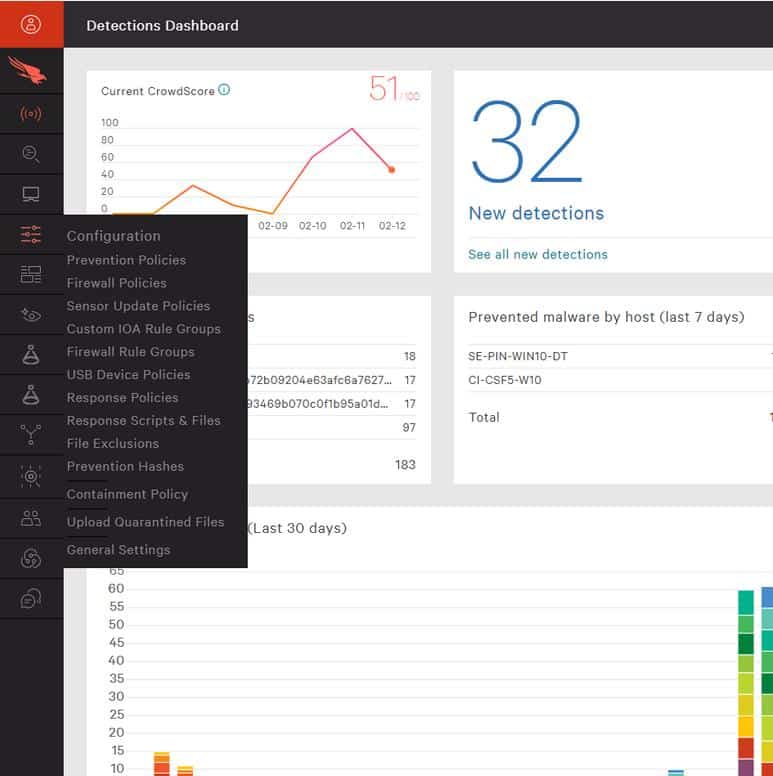
CrowdStrike produces a complete system security suite, which includes endpoint protection (anti-virus) and firewall features under the Falcon band name. The CrowdStrike Falcon Firewall Management system enables each device to have a separate defense system, while still allowing centralized control. This is achieved by implementing the firewall with an agent on each device, so it is a “networked” firewall, rather than a network firewall.
Key Features:
- Coordinates third-party firewalls: It isn’t a firewall
- Standardizes access controls: Formulates and implements security policies
- Tailored for compliance: Enforce controls consistently across the enterprise
- Gathers activity reports: Can feed logs into a SIEM
Why do we recommend it?
CrowdStrike Falcon Firewall Management is a competitor to the SolarWinds and ManageEngine tools on this list because it enhances your existing firewalls instead of replacing them. This is a cloud-resident service that helps you create a security policy and then implements it by writing rules into all your endpoint and network firewalls.
The entire protection system is cloud-based, with the console being accessed through a browser. The distributed nature of the firewall – protecting each device – requires some software to be loaded onto each endpoint. However, the on-device software is all coordinated centrally, so it is very easy to standardize settings and create policies for all devices, or groups of devices, they can then be implemented with the click of a mouse.
The cloud-based strategy of Falcon’s firewall removes the heavy processing load that cybersecurity software often creates. It also removes the need to manage an update policy and there is no need to install or manage signature databases on each device because all of the detection processing occurs on the CrowdStrike servers.
Who is it recommended for?
This package is suitable for large businesses with many endpoints on many sites to watch over. It coordinates the detection and response services of all firewalls on your network and provides a sort of internal threat intelligence sharing service. One problem is that this tool doesn’t reach out to Linux systems.
Pros:
- Implements process scanning: Threat hunting
- Acts as a HIDS: Provides endpoint protection
- Can track and alert anomalous behavior over time: Adapts behavior baselines
- Lightweight agents: Won’t slow down servers or end-user devices
Cons:
- Doesn’t monitor Linux-based firewalls: Only those based on Windows and macOS
CrowdStrike offers a 15-day free trial of all of its Falcon security suite, including the firewall management system.
8. pfSense
pfSense is an open-source firewall product that can be configured through a web-based user interface. pfSense can be installed on any hardware enabling it to adapt to the needs of organizations of all sizes. Through the GUI you can view data on traffic, interfaces, and gateways to manage your network. There is also a reporting feature so you can take a closer look at resource utilization.
Key Features:
- Free version available: Often included with Web hosting plans
- Includes virtual network management: Can implement traffic management
- IP and DNS blacklisting: Firewall rules
Why do we recommend it?
The pfSense software is available as a free firewall package and it is frequently deployed on academic systems for network management training courses, so many network administrators will become familiar with it before they even reach a level of responsibility for network security. A notable feature is its extra modules.
One of the reasons why pfSense is so widely used is its packages. Packages like Squid, pfBlockerNG, SquidGuard, Darkstat and Snort add additional features and functions to the program.
For example, pfBlockerNG blocks ingoing and outgoing traffic based on IP address and domain name. You can also use pfBlockerNG to implement IP and DNS blacklisting to stop suspicious users from being able to connect to your site.
Who is it recommended for?
This package can be downloaded and hosted for free on your own server. So, this firewall software is appealing to small businesses. Larger organizations would be more interested in paying for a professional support package and accessing the firewall as a cloud service or a network appliance.
Pros:
- Open source firewall application: Doesn’t require special hardware
- Integrates well into popular security tools: Such as Snort, Darkstat, and pfBlockerNG
- Blacklist management: Use bulk uploads
Cons:
- No professional support for the Free edition: A community forum and knowledge base are available
If you’re looking for a low-cost, open-source firewall solution that’s easy to configure then pfSense is a product that’s worth considering. You can download the Community Edition of pfSense for free (you can also purchase additional support from NetGate if you require extra assistance). Download pfSense for free.
9. IPFire
IPFire is an open-source firewall for Linux. The firewall has a mixture of QoS and security settings so your network can stay secure while keeping performance high. To identify threats the software uses an Intrusion Prevention System that can identify and block online threats such as DoS attacks. The system alerts you during an attack and blocks the attack automatically.
Key Features:
- Intrusion prevention: Set up behavior detecting firewall rules
- Runs on its own operating system: You can install it inside a VM
- Automated responses: Create triggers for actions
Why do we recommend it?
IPFire is a free firewall software and it is a rival to the pfSense system. You can run it on a server for free or buy the package on a network appliance. The appliance route will get you professional support. The tool can implement QoS traffic management measures as well as security. The software is only available for Linux.
The user can also configure the platform to filter DOS attacks at the firewall so that they don’t affect network performance. IPFire also uses Stateful Packet Inspection to filters packets for malicious content. The user can also create custom configurations and security policies to determine which connections to allow.
The tool is also regularly updated so that it can defend against the latest threats. Graphical reports provide the user with a comprehensive view of the network. In addition, there a range of add-ons that enable the user to use IPFire as a Wireless Access Point, health management tool, or backup solution.
Who is it recommended for?
The market for IPFire is exactly the same as that for pfSense. There are a few points that give pfSense the edge over IPFire. The IPFire software hasn’t been updated since 2019. There isn’t a cloud version of this tool and its appliance options are more expensive than the pfSense devices.
Pros:
- Free open-source platform: You can donate if you want to pay
- Offers traffic shaping: Implements QoS monitoring
- Utilizes stateful packet inspection: Mitigate threats such as DDoS attacks
Cons:
- No paid support option: You have to rely on the community for help
IPFire is a solution for enterprises that want to protect against cyberattacks without compromising network performance. SME’s are also supported given that the program can be downloaded for free. You can download the platform for free.
10. Sophos XG Firewall
Sophos XG Firewall is a next-generation firewall that can detect suspicious traffic and advanced threats. The tool uses a combination of deep learning and an intrusion prevention system to detect new threats.
Key Features:
- Unified threat management: Blocks intrusion and malware
- Automated threat response: Set up response actions
- Traffic performance monitoring: Look for traffic shaping opportunities
Why do we recommend it?
Sophos XG Firewall provides a full system security service through the gateway. It includes a data gathering service and a threat detection module, so it is a lot more than a straightforward firewall because of its network-based intrusion detection system (NIDS). It also provides user behavior analytics.
After discovering a problem, Sophos XG Firewall uses an automatic threat response to automatically respond and isolate the compromised system. Sandstorm sandboxing helps to quarantine the threat and stop it from spreading.
To detect threats hidden in encrypted traffic, Sophos XG Firewall uses SSL inspection. SSL inspection makes the program ideal for fighting off the encrypted attacks that have become increasingly common.
The program also has a dashboard where the user can see an overview of systems, network attacks, traffic, user and device insights, and alert messages. Visualizations and graphs allow you to monitor security events at a glance. For example, you can view a graph of web activity to spot any unusual fluctuations in traffic.
Who is it recommended for?
Sophos’s market niche is catering to mid-sized businesses and this firewall product pushes at the top end of that market. The system could also cater to larger, multi-site businesses. Naturally, all of the extra features of the XG Firewall push the price up and also make the service more complicated to administer.
Pros:
- Attractive interface: Well laid-out screens with graphics and good use of color
- AI-based detection: Spots zero-day attacks
- SSL offloading: Enables deep packet inspection
Cons:
- Could benefit from more integrations: Requires manual setup
Sophos XG Firewall is a great choice for organizations in search of an advanced firewall solution that can detect encrypted attacks. Features like deep learning and SSL inspection help to detect even the most sophisticated attacks. Contact the company directly for pricing information. You can start the 30-day free trial.
Choosing network firewall security software
Defending against online attackers is impossible without a firewall. A firewall is necessary to block unauthorized or suspicious traffic from entering your network. Network firewall security software stops persistent cyber-criminals from disrupting or breaching your service.
Companies with a reliable firewall can rest easy knowing that they are equipped to discover and address the latest threats. There is a tremendous range of firewall tools that can help to thwart online attackers.
Firewall management tools like Tufin Orchestration Suite, NordLayer and modern firewalls like CrowdStrike Falcon, ManageEngine Firewall Analyzer, Zscaler, and GFI KerioControl are all top proprietary firewall software products that can help you configure your defenses and shut down attacks.
There are also open-source alternatives like pFSense and IPFire which are also highly effective with add-ons and vast configuration potential.
Related post: Next-Gen Firewalls
Network Firewall Security FAQs
What's the difference between a consumer firewall and a network firewall?
Consumer firewalls are designed for home-users to protect single devices and use content/packet filtering to block basic cyber attacks.
Network firewalls, also called enterprise firewalls, use packet filtering but also incorporate more advanced features like SSL inspection, threat intelligence, and antivirus capabilities.
These platforms are more scalable and are designed to stop more sophisticated attacks. For example, many enterprise firewalls use SSL inspection to detect more advanced encrypted attacks that cunning attackers are using to sidestep less advanced defenses.
What's the difference between network firewalls and website application firewalls?
Network firewalls control access to your network to keep out unwanted traffic. Website Application Firewalls (WAFs) prevent attacks on websites and applications. WAFs primarily prevent SQL injection attacks, application layer attacks, and malware that compromise online services.

